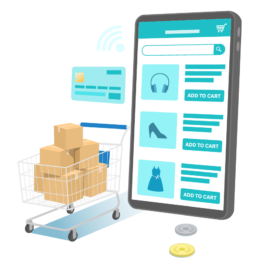The Online Retail Businesses You Can Start
As an entrepreneur, you need to decide on a business model that best fits your business idea and products to start an ecommerce company.
- Dropshipping Business
- Private Labeling
- White-Labeling Mode
- Wholesaling and Warehousing
- On-Demand Manufacturing
- Subscription-Based Business
Regardless of the business model and idea you choose, registering your online business is still a necessity.
Hassle-free state and federal filings
Things You Need to Start an Online Business
Starting a business requires time, planning, startup capital, and consistent effort.
However, that’s not all.
Here’s what you need to do to start an online business from scratch and make money:
Identify or Create Products to Sell Online
First things first, setting up a retail business online requires that you find or create products that many people will be willing to buy.
- Find products that can solve a problem.
- Choose products you are passionate about.
- Find products you can improve.
- Tap into a niche market or product line.
- Find products with branding potential.
- Hop on emerging market trends.
You can create a list of products and prioritize the ones you want to (and can) sell to potential customers when starting an online business.


Conduct Market Research
Validate your business idea by conducting market research. Also, analyze what you can do differently to outrank your competitors.
All you need to do is answer the following questions:
- Are people searching for your products?
- What is the market size and demand for your products?
- Can you manufacture or source your products?
- Who is your target audience?
- Can your potential customers buy the products locally?
- Who are your competitors?
- How much profit margin can you keep?
This will help you evaluate how feasible each of your business ideas is and whether or not you should invest time into starting a business.
Set Up and Promote Your Online Store/Ecommerce Site
To run a business online, you need to set up an online storefront for your business.
You can either set up your e-store on online marketplaces such as Shopify, Amazon, and Etsy or choose platforms such as BigCommerce, WordPress, and WooCommerce to build your own ecommerce website.
In both cases, you need to:
- Pick a business name, brand colors, and font styles.
- Choose a theme or template for web design.
- Take product photos and upload them.
- Write compelling copy and product descriptions.
- Incorporate payment processing functionality.
- Promote your products and business online.


Form a Legal Business Structure
You need to choose an entity type to form an ecommerce company legally and get authorized to sell products online.
The most popular legal business structures include:
While each of these entity types has its own pros and cons, forming a limited liability company (LLC) is the most common choice for new startups and small online retail businesses. It lets business owners have maximum control over decision making while enjoying protection from personal liability.
GovDocFiling can make it easier for you to complete the filing process and paperwork to register your online retail business.
Easy to apply. Expedited formation process.
How to Form Your Ecommerce LLC in 9 Steps
Wondering why we are emphasizing LLCs as the best business structure for starting an online business?
A Limited Liability Company (LLC) is a preferred business structure for starting a business due to the ease of formation and flexibility it offers.
Here’s the step-by-step guide to starting an online business the right way:
Step 1
Decide On Your Niche
Decide on what are you going to sell and to whom. This is the most crucial step to start an online retail business. You can pick niches such as healthcare, beauty, fashion, books, electronics, jewelry, shapewear, footwear, etc.
Step 2
Finalize the Products You Want to Sell
The next step is to either create new products or choose existing products from brands that offer white labeling options. You can also buy products wholesale from other vendors and companies and resell them on your online store.
Step 3
Pick a Business Name
Brainstorm a business name that is unique, short, and crisp, does not refer to a specific product or product line, and is available with a .com domain name. Also, buy its domain name from a registrar such as GoDaddy.
Step 4
Understand the Benefits of Choosing an LLC As Your Business Structure
While there are many entity types, forming a limited liability company is the easiest and most flexible way to start a business.
LLCs require moderate paperwork and minimal compliance requirements while they offer personal liability protection, management flexibility, and pass-through taxation.
Step 5
Complete Federal and State Filings with GovDocFiling
Whether you form an LLC or choose another entity type for your online business, you need to complete federal and state filings. To form an LLC, you need to file Articles of Organization, create an LLC Operating Agreement, and acquire a Tax ID/EIN from the IRS.
GovDocFiling makes it easier for you to complete the legal paperwork with one, simplified, online application and also expedites processing of your formation documents with the state.
Step 6
Open a Business Bank Account
A business bank account will help you separate your personal and business finances. You will have to submit your business formation documents and Employer Identification Number (EIN) or Tax ID to create a bank account.
Step 7
Find Vendors and Suppliers
You need to find and build business relationships with trustworthy and reliable manufacturers, suppliers, vendors, dropshippers, and other third-party service providers based on your online business needs.
Step 8
Decide on an Ecommerce Platform or Build a Website
You will need a domain name, hosting plan, and website builder to build your own ecommerce website. You can also choose to sell your products on online marketplaces such as Shopify and Amazon.
Make sure that you optimize your web design and storefront for user experience and conversions.
Step 9
Market Your Online Store
Starting an online business is easy but attracting potential customers to your store can be challenging.
To increase visitors to your online store, you should use SEO, build a strong presence on social media, promote your products to a targeted email list, start a blog, and try other marketing channels.
Now that you know what it takes to start and grow an online business successfully, it’s time to plan and launch yours.
Invest your time in researching, product planning and sourcing, and marketing while our experts take care of the complicated legal processes for you.
One, simplified application for easy filing.
Why Choose GovDocFiling to Register Your Online Business?
We are entrepreneurs, just like you.
We have been there and we understand the needs of budding entrepreneurs. We’ll get you everything you need and nothing you do not need.
You’ll only pay for the documents, processes, and services your business actually needs.
GovDocFiling offers benefits such as:
Register and launch your online business with us in a hassle-free, quick, and cost-effective way.
Easy filing. Expedited processing. No additional cost.
6+
Years Of Experience
10,000+
Businesses Formed
100%
Satisfaction Guaranteed
Frequently Asked Questions
What is an example of a tax ID number?
A federal Tax ID Number is an identification number used by the Internal Revenue Service (IRS) to administer tax laws. This number is issued either by the IRS or Social Security Administration (SSA). A business Tax ID number is required on tax return forms.
Learn MoreHow do I get an EIN application?
An Employer Identification Number is a nine-digit number that identifies your business. It works much the same way your social security number does. If your company has employees, is a corporation or partnership, has a Keogh Plan or fits one of several other situations, it must have its own EIN.
Learn MoreHow many EIN numbers can I have?
As a business owner, you probably know your company needs an EIN (or Tax ID Number) issued by the IRS for tax purposes. But what if you own multiple businesses or operate different divisions of the same entity?
Learn MoreWhat is the purpose of a tax ID number?
Your business is going to need to file income taxes. The Internal Revenue Service uses Tax Identification Numbers to distinguish between individuals, business, and nonprofit organizations, but business tax ID numbers should be distinct from your personal federal tax ID number.
Learn MoreWhat does it mean to have a tax ID number?
For the IRS to conduct its business, it must have an easy way to identify each individual and business. To do this, they require each individual and business to have a tax ID number.
Learn MoreHow does an SSN differ from a tax ID?
A social security number (SSN) is a tax code used by an individual, while a tax ID is a nine-digit tax code for a business entity. For a business entity, a tax ID is usually called an EIN.
Learn MoreWhat is a DBA?
If you’ve ever considered working for yourself, or starting your own business, you may have wondered: what is a DBA? Is a fictitious business name the same as a DBA? What are the benefits of a DBA to my business and myself?
Learn MoreCan a DBA be filed for all business types?
Each type of business entity has clear advantages and disadvantages. Can a DBA be filed for all business types? In most cases, yes; but understanding what a DBA is and what it’s limitations are will help you decide if it’s worth
Learn MoreHow many DBA names can I register?
DBA application filing is a process overseen by state DBA laws and local government, protecting the public from nefarious business owners. DBA is an abbreviation for “doing business as,” and is also referred to as a fictitious name or trade name.
Learn MoreDo I need a DBA?
If you’ve ever considered freelancing, or starting your own business, you should take a few moments to answer this very important question: Do I need a DBA? Not every small business owner needs to pursue DBA application filing, but
Learn MoreAre any words prohibited in a DBA name?
DBA is an acronym that stands for “doing business as.” You may be wondering “do I need a DBA?” If you intend to do business using a name other than your legal business name, you need a DBA. DBAs are common for sole proprietors or partnerships that do not want to use the owners’ legal names to do business.
Learn MoreDBA vs. EIN
If you’re starting a business, there are more then a few abbreviations you’ll need to remember. Filing a DBA application, or applying for an EIN, are two common steps for new business owners. However, they are not the same thing, and as a business owner you should know the difference.
Learn MoreWhat is an LLC?
A limited liability company, commonly referred to as an LLC, combines the taxation benefits of a partnership with the limited liability of a corporation. Instead of partners, LLC business owners are called members, and there can be several, or a single member.
Learn MoreWhat are the benefits to filing for an EIN as an LLC?
A limited liability corporation is one in which the members aren’t personally responsible for any company liabilities or debt. Limited liabilities have the protections of a corporation but the flexibility of a partnership. If your business is listed as a limited liability corporation, you can benefit further by applying for an Employer Identification Number.
Learn MoreWhat’s the difference between an LLC and a corporation?
The fine print that separates a limited liability company (LLC) from a corporation can be overwhelming for new business owners or entrepreneurs. While the minutia of these details might be best suited for a legal advisor or accountant, the broad differences are fairly easy to understand, and they might be enough to help you make a judgment
Learn MoreWhat happens if I apply for the wrong LLC?
Limited Liability Companies (LLC) are popular business structures because they offer personal liability protection for members and don’t have all the formalities that corporations do. LLCs also enjoy pass-through taxation, which means the company doesn’t pay federal income taxes; instead,
Learn MoreWhat legal documents do I need to start an LLC?
For entrepreneurs thinking about starting their own business, forming an LLC is an ideal option, as such an entity provides the owners protection from lawsuits, business debts and other business indiscretions. However, in order to obtain that protection, there are a number of documents that the business owner or owners must file with the state government prior to conducting business.
Learn MoreWhat are the differences between a partnership and a Limited Liability Company?
A Limited Liability Company is a legal entity all its own, while a partnership is owned by two or more people who share legal responsibility of the business entity. In a partnership, the business does not possess a legal identity outside of the business owners. A Limited Liability Company offers more flexibility in terms of operations and personal asset protection.
Learn MoreWhat is a C-Corporation?
A C-Corporation is just anther way of saying corporation. It means the same thing. Corporations are incorporated business entities that file Articles of Incorporation with the Secretary of State or a similar government agency.
Learn MoreCan a C-Corp have multiple owners?
There are certain C-Corp requirements to meet whether you want to start a corporation with one shareholder or dozens. It is certainly possible to apply for a C-Corporation EIN with multiple owners, and when forming a C-Corp in this manner, there are a few points to keep in mind.
Learn MoreWhy is a C-Corp taxed differently than an LLC or S-Corp?
Unlike other business structures, C-Corp taxation is significant in that corporations are taxable entities. Corporations are taxed like an individual and contribute according to corporate income, and then again on shareholder tax returns. This is commonly called ‘double taxation’.
Learn MoreWhat is an S-Corp?
S-Corporations, sometimes called S-Corps, can be useful ways for business owners to avoid what’s called “double taxation”, while also protecting shareholder assets from personal liability. It’s a mix of advantages drawn from other types of business entities; and it isn’t nearly as complicated or time consuming as you might think to establish.
Learn MoreHow do I file to become an S-Corporation?
Before we dive into how to file to become an S-corporation, let’s take a look at what an S-corporation is, exactly, and why you may want to establish this type of business entity for your company. S-corporations are similar to partnerships, or sole proprietorships, at least in terms of how the company will affect you financially.
Learn MoreWhat is a disqualified S-Corporation?
There’s No Such Thing as a Disqualified S Corporation. Luckily, S corporation disqualification is more of an urban legend than fact. In 2010, Congress attempted to pass a measure that would have disqualified some S corporations, primarily small businesses, from using S corp tax structures when filing.
Learn MoreStarting an Online Business? Get Everything You Need
GovDocFiling is committed to helping business owners form, register, and start their online businesses from scratch.
Fastest business formation online. 24/7 support.
Choose Your Business Entity Type to Get Started
Launch your dream business with hassle-free online filing services by GovDocFiling in no time.
Select an Entity Type
Get started with our fast Tax ID/EIN application process. Select an entity and fill out the required fields
Explore the Entity Types
Click on the links below to learn more about the taxation rules and benefits of each entity type.
